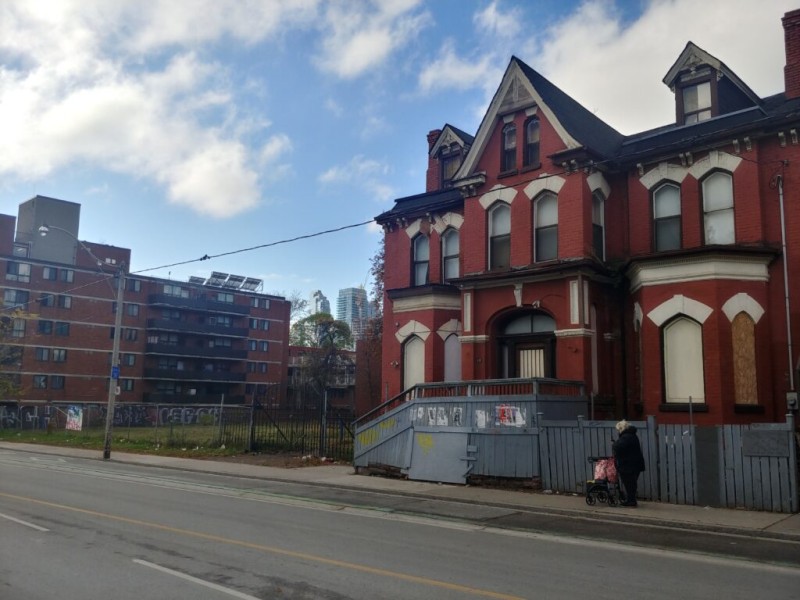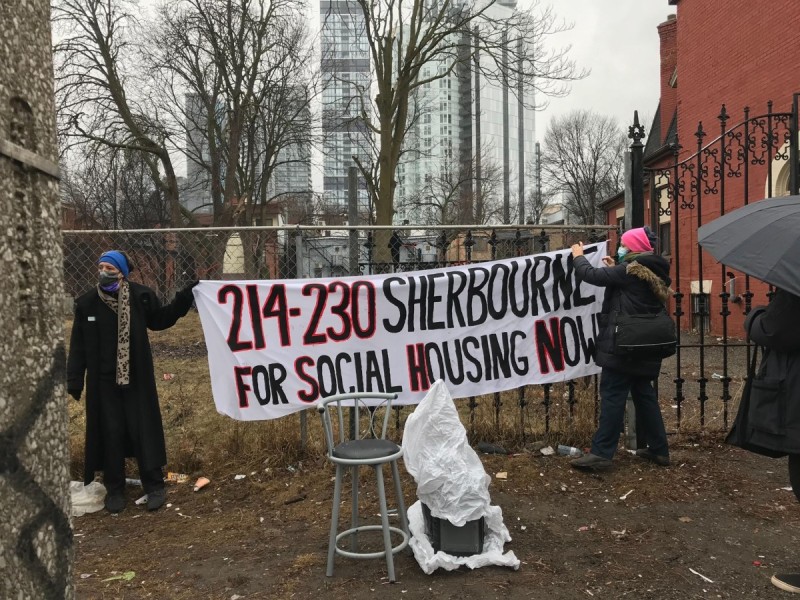Fighting the commodification of housing
The struggle in Toronto’s Downtown East is but one expression of the need to confront the profit-driven mode of creating housing

Century home and adjacent lot comprising the 214-230 Sherbourne properties. Photo by Andre Bermon.
For the last year and a half, I have been part of a local grassroots struggle that is unfolding in Toronto’s poor working class Downtown East community. We are challenging the commodification of housing, the destructive power of the developers and the role of the politicians in enabling that power.
Gaétan Héroux and I wrote an article for Canadian Dimension in November of 2022 that set out the essential features of the challenge facing the community. As part of a powerful juggernaut of redevelopment in the area, the developer, KingSett Capital, had acquired ownership of a site at 214-230 Sherbourne Street and planned to build a luxury condo tower at this location. This threatened to accelerate the ongoing process of gentrification and, with it, the displacement of the local population.
To fight the condo project and to advance the longstanding demand for social housing at this site, local people and their allies worked to form the organization 230 Fightback. We immediately began to confront the developer, demanding KingSett abandon its plans for this damaging luxury project and give up ownership of the site. At the same time, we called on city hall to intervene and see to the construction of housing that meets the needs of the community.
Community action
Throughout 2023, various community actions were organized to expose and confront the destructive behaviour of KingSett. Protests were held outside (and inside) their Bay Street offices on a number of occasions, with allies in Montréal and Vancouver targeting their headquarters in those cities for good measure.
KingSett’s CEO, Jon Love, is promoted as something of a public benefactor and so we put a premium on challenging his dubious credentials as an emissary of ‘compassionate capitalism.’ Award ceremonies and other events at which he appeared were met with demonstrations and picket lines.
In December of last year, the night before another planned protest at KingSett’s Bay Street lair, we received an email from William Logar, the developer’s chief asset management officer. He informed us that “KingSett has offered to sell 214-230 Sherbourne back to the City of Toronto for a value that covers the cost we have incurred to date (and no more).”
Logar was clearly anxious to assure us that his firm was motivated by the highest ideals in taking this step. As he put it, “We understand what this property means to the local community, and we are now patiently awaiting a response from the city regarding 214-230 Sherbourne.” We would soon have some substantial grounds for doubting that the underlying motives were quite as altruistic as the email would have had us believe.
It was immediately clear to us that this apparent readiness on the part of KingSett to walk away from its condo project meant that the focus of our efforts had to be significantly shifted over to city hall and, particularly, onto the avowedly progressive mayor, Olivia Chow. Unfortunately, repeated efforts to get a meaningful response from the mayor’s office on this issue had been unsuccessful. A mass delegation to the office in December was met with locked doors and security officers.
In an article for Canadian Dimension, I concluded that for the changing of the guard in the mayor’s office to make a difference, “the very worst approach would be to leave it all in Chow’s hands. She will need vigorous social movements pushing at her back, and ready to push harder at the first sign of retreat. If we can muster those forces, some real victories are entirely possible…” The experiences of 230 Fightback seem to confirm this perspective.
Protesters with the Ontario Coalition Against Poverty put up a banner demanding affordable housing outside 230 Sherbourne in Toronto’s Downtown East. Photo courtesy Kristyn Wong-Tam/X.
On January 25 of this year, we made a more determined effort to pressure Chow’s office into dealing with the situation at 230 Sherbourne. We brought another mass delegation to city hall but this time we insisted that we would not leave without a meeting with senior staff who were empowered to convey the mayor’s position to us and negotiate on that basis. We stated clearly that the only alternative to such a meeting would be to call in the police in order to remove us.
As it happened, our refusal to budge did the trick and we were able to meet with the mayor’s representatives. Our discussions with them and an email from the local city councillor, Chris Moise, revealed more about KingSett’s motivations. Though the mobilization of community opposition had certainly rankled the image conscious developer, their desire to unload the property had a great deal to do with diminished profitability.
The condo market has been hard hit by interest rate hikes, and project delays are now common. However, this particular site is also being impacted by zoning changes regarding the height of buildings, which would have obliged them to reduce the scale of the venture if they went ahead with it. Given these circumstances, they hoped to sell to the city and have the costs of their failed speculative antics covered at public expense.
From an interview that Councillor Moise did with CP24 at this time, we also know that KingSett had approached him directly to “get his thoughts on the city bidding for a second time on the site.” He told the journalist, “I know how important it is to the community. As the local councillor I’m doing everything I can to support. … It’s a priority to me.” The mayor’s representatives also informed us that they were anxious to find the means to create viable housing on the site that would meet the needs of the local community.
These positive developments notwithstanding, we understood the political problem we’d be facing with city council, including those local elected officials who brandish their progressive credentials. Essentially, it comes down to a deeply rooted sense of the inevitability of a system of housing provision based on profit and susceptible to the destructive greed of developers. If KingSett holds out for a high price and refuses to budge from that position, the thinking goes, then nothing can be done. We intend to challenge that assumption.
Back to city hall
On March 21, 230 Fightback returned to city hall to again press our demands, making our way to the mayor’s office and rallied there. The message we delivered was that KingSett should not be allowed to hang onto this property and hold out for a price that would cover its speculative losses. This developer relies on city hall to grease the wheels of its profit-making in a thousand ways. It is defeatist to suggest that it can’t be pressured into letting go of the site. But in order for this to happen, it will have to be challenged, and this is what the councillors are reluctant to do.
Our message was amplified by speakers from a range of organizations representing unhoused people as well as those struggling against landlords and developers across the city. All of us are aware that the fight in the Downtown East is but one expression of the need to challenge the present profit-driven system of creating housing.
With a council meeting underway, we had intended to go to the chambers but our way was blocked and the elevators taken out of service. Such measures were never taken when Rob Ford and John Tory were in the mayor’s office and it is sad that this should happen under Olivia Chow.
We were informed that our loud and defiant march through the building in response to the barring of our access to the council meeting would result in several of us being temporarily banned from city hall. It goes without saying that such administrative measures won’t stop us.
In 230 Fightback’s struggle so far, we have refused to limit our demands and actions to conform to the defeatist notion that developers quest for profit gives them free reign to thwart the creation of housing that meets the needs of communities.
We have also focused our efforts on the very immediate and vital objective of ensuring that a major upscale development in a poor working class community be prevented. We are resolute in our effort to make sure this community won’t be priced out or pushed out.
At the same time, the fight over the fate of 230 Sherbourne points to the desperate need to reverse the rampant commodification of housing that has caused so much damage in Canada and internationally. For that to happen, it will be necessary to build a movement among communities under attack that can challenge the power of the developers and confront their political enablers.
John Clarke is a writer and retired organizer for the Ontario Coalition Against Poverty (OCAP). Follow his tweets at @JohnOCAP and blog at johnclarkeblog.com.










